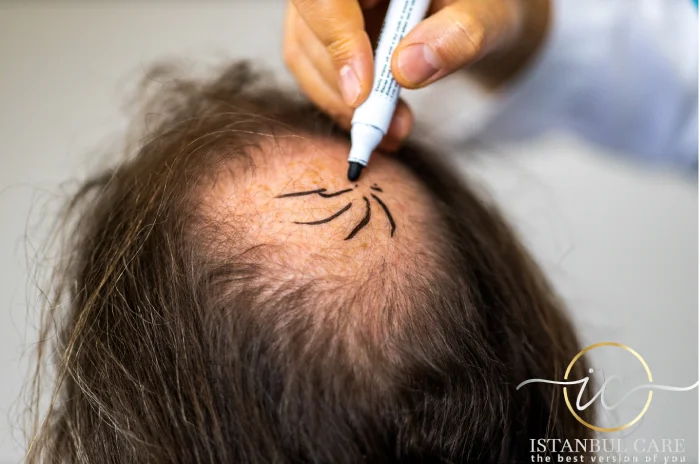A Guide for the Best Hair Transplant Candidate
Hair Transplant Eligibility is a significant factor to consider. Understanding who makes an ideal candidate ensures optimal results and satisfaction.
FUE Hair Transplant in Turkey: Why Choose Istanbul Care Clinic?
Are you considering an FUE (Follicular Unit Extraction) hair transplant in Turkey? Look no further than Istanbul Care Clinic, your destination for world-class hair restoration services in the heart of Istanbul. Discover why our clinic stands out and how we can help you achieve your hair restoration goals with professionalism and care.
Are You a Good Candidate for Hair Transplant?
Ideal candidates typically have:
- Sufficient Donor Hair: Healthy hair growth at the back and sides of the head to serve as donor areas.
- Stable Hair Loss: A predictable pattern of hair loss, such as male or female pattern baldness.
- Good Health: No underlying medical conditions that could complicate surgery.
How Effective is Hair Replacement Surgery?
When performed on suitable candidates, hair replacement surgery offers natural-looking and lasting results. The transplanted hair blends seamlessly with existing hair, enhancing appearance and confidence.
Who is the Best Candidate for Hair Replacement Surgery?
The optimal candidate:
- Understands the Procedure: Has realistic expectations about outcomes.
- Possesses Adequate Donor Hair: Ensures sufficient follicles for transplantation.
- Experiences Patterned Hair Loss: Such as androgenetic alopecia.
Why Choose Istanbul Care Clinic?
1. Expertise and Experience: Our surgeons are leaders in the field of hair restoration. With years of experience and specialized training, they deliver exceptional results tailored to each patient's unique needs.
2. State-of-the-Art Facilities: Our clinic is equipped with cutting-edge technology and adheres to the highest standards of safety and hygiene. We prioritize patient comfort and well-being throughout every step of the process.
3. Personalized Treatment Plans: We understand that every individual's hair loss journey is different. Our team takes the time to assess your specific concerns and goals, crafting personalized treatment plans for optimal results.
4. Affordable Excellence: We offer competitive pricing without compromising on quality. Enjoy cost-effective FUE procedures in a premium setting, making hair restoration accessible to more people.
Our FUE Hair Transplant Process
- Consultation: Your journey begins with a comprehensive consultation where we discuss your expectations and outline a customized treatment plan.
- FUE Procedure: Using advanced extraction techniques, our skilled surgeons transplant individual follicular units to achieve natural-looking results.
- Post-Operative Care: We provide detailed post-operative instructions and support to ensure a smooth recovery and successful outcome.
Why Turkey for FUE Hair Transplant?
Turkey has become a global hub for hair transplants, attracting patients from around the world. The combination of expertise, affordability, and a welcoming atmosphere makes Turkey an ideal choice for those seeking hair restoration solutions.
Contact Our Clinic Today!
Ready to take the first step towards a fuller head of hair? Contact us to schedule your consultation and learn more about our FUE hair transplant services. Discover why we're a trusted name in hair restoration in Turkey. Let us help you regain confidence with natural and lasting results.
How to Determine if You’re a Good Candidate for Hair Replacement Surgery
Consulting with a hair restoration specialist is crucial. They will assess your hair loss pattern, donor hair availability, and overall health to determine suitability.
Aftercare Tips for Hair Replacement Surgery
Post-surgery care is vital for optimal healing:
- Follow Medical Advice: Adhere to prescribed medications and care routines.
- Avoid Strenuous Activities: Allow time for proper healing.
- Maintain Scalp Hygiene: Keep the area clean to prevent infections.
Determine if Hair Transplant Surgery is Right for You
Assess:
- Extent of Hair Loss: Is it significant and stable?
- Donor Hair Quality: Is there enough healthy hair for transplantation?
- Health Status: Are there medical conditions that might affect surgery?
Do You Have Realistic Expectations?
Understanding that results vary and may require multiple sessions is essential. Aiming for improvement rather than perfection leads to greater satisfaction.
Are You in Good Health?
Good candidates are generally healthy, without conditions like uncontrolled diabetes or bleeding disorders that could impede healing.
What If You’re Not Ready for a Hair Transplant?
Explore alternatives like:
- Medications: Such as minoxidil or finasteride.
- Lifestyle Changes: Improving diet and reducing stress.
- Non-Surgical Therapies: Like laser treatments or PRP therapy
We’re ready to answer your questions
Initial hair growth typically begins around 3 to 4 months post-surgery, with fine hairs emerging first.Yes, experiencing shedding, known as "shock loss," within the first 2 to 4 weeks is common and temporary.Noticeable hair growth usually occurs between 5 to 9 months, with hairs becoming thicker and more substantial.Final results are generally achieved between 12 to 15 months, with full maturation of the transplanted hair.Yes, areas like the crown may experience slower growth, potentially taking up to 18 months for complete results.Individual factors such as age, hair type, and overall health can influence the growth rate and final outcome.Following your surgeon's aftercare instructions, maintaining a healthy diet, and avoiding smoking can promote better results.Individuals with stable hair loss, sufficient donor hair, and good overall health are ideal candidates for a hair transplant.Yes, women with thinning hair or localized hair loss can benefit from specialized techniques like DHI or unshaven FUE.There is no strict age limit, but most experts recommend waiting until hair loss stabilizes, typically after age 25.Certain conditions like uncontrolled diabetes, severe scalp conditions, or autoimmune disorders may affect eligibility. A consultation is necessary to assess individual suitability.
Follow us on social media for updates, tips, and patient success stories:


